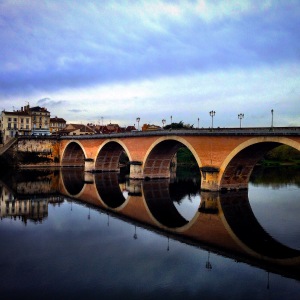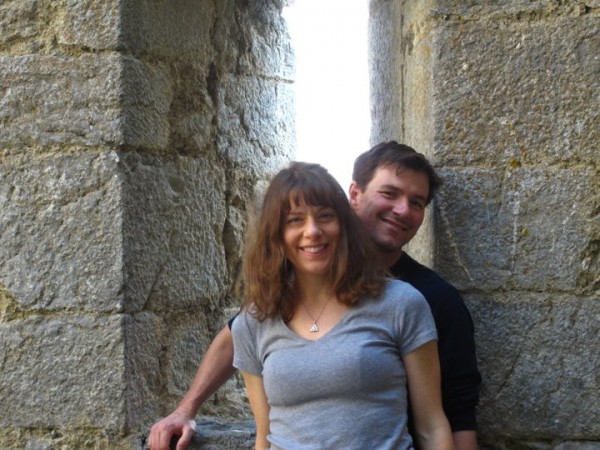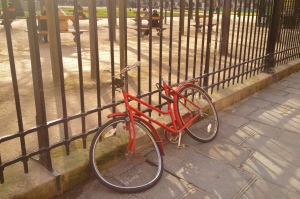It starts with a red-hot ball at the bottom of my rib cage and shoots on a wire up my chest, to the back of my throat, and flares in a starburst of electricity that flushes my cheeks. My lungs clench and the red-hot ball drops into my bowels, where it run molten through the twists of my intestines. My legs tremble, my feet tingle, my fingers turn to ice. In my brain the screaming begins. I can't. I can't. I can't. The plane rolls forward and I know it's my last chance. If I scream aloud, they'll stop the plane. They'll let me out, into the open air. I won't spend the next ten hours trapped inside a titanium tube, hurtling across an ocean, unable to step outside, unable to breathe. It's my last chance before an ascent into madness.
I pull the wire-bound collection of The New York Times Sunday crossword puzzles from the seat pocket in front of my knees. I direct my remaining bright spots of rational thought to the first clue of puzzle #24: Fly with a long proboscis. My hand shakes as I write "Tsetse" into the squares. My body presses back into the seat at the plane tilts toward the sky. It is too late. My next breath of fresh air is ten hours away.
Julie, you can't recall a time when you weren't claustrophobic, can you? Remember that Hootenanny in a barn on a dairy farm on the Olympic Peninsula? Hot apple cider, fiddlers, and a maze made of hay bales. You crawled in the dark, through the musty bales, bumping nose to tail with giggling grade-schoolers, searching for the exit. You got about twenty feet in and began screaming in terror, scratching and crawling your way out, to emerge choking on wails and hay dust. You would have been about five or six.
Or that show of silly bravado when you were twenty-one and descended into the gurgling bowels of Paris to gawk at piles of bones in the creepy half-light that reflected off weeping stones. You came to your senses just as they began to take leave of you. Fortunately, your companion was a Paris beat cop who had a crush on you. Bruno whisked out his flashlight, his badge, and you held onto the back of his leather jacket as he pushed back through the line and up the spiral staircase, shouting "Step Aside! Emergency" You emerged in a December downpour that ran with the tears you couldn't help as your heart unclenched and you gulped the air.
Elevators? Oh yeah. All about elevators. Was it San Diego State? UCLA? Some shiny-hot campus where you had to deliver a presentation to a class of International Business students. The classroom was on the twentieth floor and you walked it, didn't you? Damn straight. You're the one walking through four levels of the parking garage to reach street level without taking the elevator, the one whose husband curbed her enthusiasm about registering for the Big Climb Seattle - a charity run up the stairs of the Columbia Tower - by reminding her she'd have to take the elevator down.
And there are elevators that simply cannot be avoided (Hello, Swedish Women's Clinic on the 14th floor of the Nordstrom Building). So you'll wait at the bank of elevators, letting cars load up until everyone disappears so you can take one alone. Should even that be unavoidable, you will hover next to the control panel, helpfully punching in everyone's floors, just to be certain no one fucks around with the buttons and somehow stalls the car. Because then it would be over.
But flying was never a problem. After my first transoceanic flight in 1990, I flew around the world- to Asia, to Africa, back and forth to Europe. Then, one warm spring day in 1999, I sat on the tarmac of Willard Airport, outside Urbana, IL, in an idling American Eagle turboprop. I was headed for a connecting flight in Indianapolis, then onto Denver for a conference. We sat on that tarmac with the doors closed, as the central Illinois heat turned our little plane into a stalled rotisserie. That's when my first on-board panic attack took flight. Just as my mind began to pull free from its hinges the plane rolled forward and the air conditioning whooshed icy relief into our cramped compartment. Somehow I got to Denver and back again.
Since that day, I haven't flown without spending at least a few shaky moments in the grip of claustrophobic anxiety. But I've kept flying. I have no qualms about crashing into the ocean in a fiery ball of wreckage. Not a bad way to go considering the many alternatives. I just don't like being trapped. What deep, dark corners of my childhood hide my need for control, for space, for cool, fresh air? Exorcising those ghosts on the tarmac of Atlanta Hartsfield really isn't opportune. So, I turn fight the lack of control with deeper, darker forces of anger and determination. I can't not travel. Being forever trapped on one continent is worse than a few hours in the air.
Crazy, lovely irony has kept my wings aloft. I spent many years as a study abroad coordinator - travel is in the job description. To Australia and Spain, to Japan and Belgium, off I went my with my heart in my toes and my stomach roiling. One job kept me traveling nine months a year, several times a month, through a territory that spanned Seattle to San Diego, Phoenix to Portland, with staff meetings in London and Atlanta every six months. I built up frequent flyer miles galore, and what else is there to do with frequent flyer miles but to fly someplace? My husband and I even moved to New Zealand, which is nearly as far as you can fly non-stop. Fourteen hours. In a 757.
So this is where I tell you that yes, I did seek help. I'd gone to a behavioral therapist years before, as a high school student. There I learned a trick or two, something to do with cognitive dissonance, about telling myself to panic just as I began to panic - my brain wouldn't be able to manage the conflict between forced panic and the avoidance thereof. That sounds pretty good in a textbook, but I reckon the therapist who led me through the mental image exercises understood as much about my phobia as I did about Geometry. Which would be for shit, since I failed Geometry. My own therapy is New York Times crossword puzzles. Cognitive dissonance via wordsmithing. It's hard to panic when you are trying to remember who won the 1962 World Series (Seven letters: Yankees).
But I'm no martyr to my cause. A few weeks before a major trip I present myself to my understanding physician and renew my prescription for an anti-anxiety medication. It takes off the raw edge of panic - a chill-pill for an over-active brain - but I can tackle a crossword without chewing my lips bloody. Several years ago, I forgot to take my pills out of the bag that I checked through on the non-stop flight from Paris to Seattle. I didn't realize the little orange vial was beyond my reach until I was on the jetway, fumbling through my carry-on. I was alone and my meltdown was invisible from the outside. I flirted with walking away from the flight, but realized my bags would travel without me. I could stay in Paris forever. Or I could take the QE II across the Atlantic and hitch a ride from New York Harbor. Or I could stop being ridiculous and muscle through the panic. I thought of the poor sods on my flight who might suffer from a fear of crashing and realized that they might need my steady hand if we started to go down. I'd be calm for them, just in case. We all survived that flight, I'm happy to report.
So here I am, packing my bags for another flight across the Atlantic. I am doing something ridiculously cool: attending two wine-tasting conferences in the South of France, followed by a few days on my own wandering in Paris. Hours and hours on a plane where I can read to my heart's content, fall asleep watching whatever pointless Katherine Heigl movie is showing on the "romantic-comedy" movie stream, and relax, which isn't something I do very often. We forget that in traveling, it's not just the destination that matters. It's the journey that offers us the opportunity to challenge who we think we are.
I just hope the hotels have stairs.








